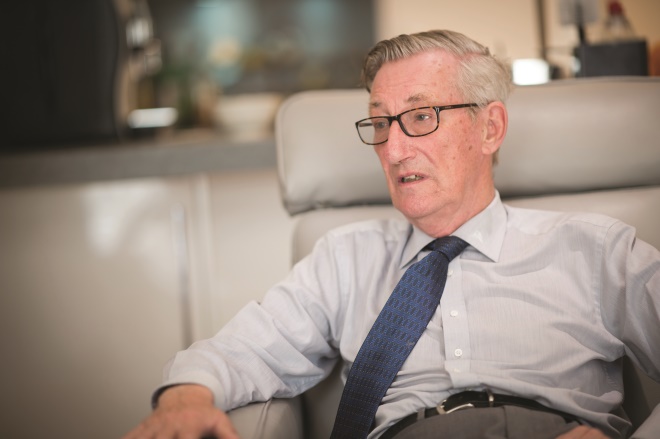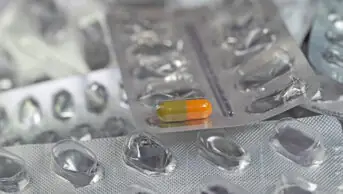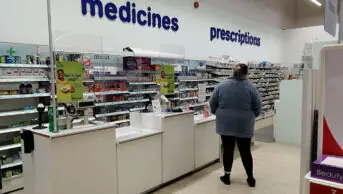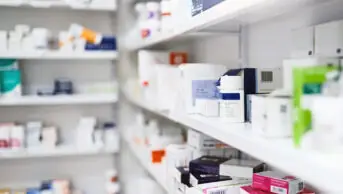
Jon Barlow
It’s not quite what we were expecting — the chair of the UK’s medicines regulator welcoming us to an apartment tucked away in a quiet street in North London.
“So, what are we doing here?” he asks cheerfully, reclining in his armchair, a coffee-stained cup, an ashtray and a Lynda La Plante thriller on the table next to him.
But don’t be fooled. He may look like a college academic — and indeed he is both an honorary and emeritus professor — but Sir Michael Rawlins is no ivory tower dweller. On the contrary, he has had a guiding role in the way the health service has been run for decades.
He chaired the National Institute for Health and Care Excellence from its inception in 1999 until his departure in 2013, and he has been chair of the Medicines and Healthcare products Regulatory Agency (MHRA) since 2014. A knighthood for his services to medicine hangs proudly on the wall.
There are 3.5 million people who rely on insulin, not least the prime minister
And perhaps it is because of this intimate setting that Rawlins seems so comfortable candidly expressing his opinions to Gino Martini, chief scientist at the Royal Pharmaceutical Society (RPS) and The Pharmaceutical Journal. Perhaps too candidly, as the MHRA press office later insisted that his comments were made “in a personal capacity” and were not representative of the body’s position.
It’s been suggested that medicines could run out in a day in the event of a ‘no-deal’ Brexit — is this realistic?
I think it’s something that we need to make sure doesn’t happen. But there are problems, and the Department for Exiting the EU and the Department of Health and Social Care need to work out how it’s going to work. Here’s just one example why: we make no insulin in the UK. We import every drop of it. You can’t transport insulin around ordinarily because it must be temperature-controlled. And there are 3.5 million people with diabetes, some of whom rely on insulin, not least the prime minister. So it’s in our interests to make sure that this sort of thing doesn’t happen.
One of the things that then health and social care secretary Jeremy Hunt and business secretary Greg Clark said in summer 2017 was that patients should not be disadvantaged by us leaving the EU. And disruption to the supply chain is one of the ways that patients could be seriously disadvantaged. It could be a reality if we don’t get our act together. We can’t suddenly start manufacturing insulin — it’s got to be sorted, no question.
What’s the ideal scenario for medicines regulation in a post-Brexit UK?
The ideal scenario would be what’s called associate membership of the European Medicines Agency (EMA), where we would contribute to the scientific assessments of medicines going through the centralised and decentralised procedures. We would be present at all committee meetings, including the scientific advisory committee meetings. We wouldn’t have a vote, but my colleagues tell me that that’s not important — it’s about explaining our views, which are listened to very carefully, and then accepting whatever decision the EMA makes. It would be a participatory membership — we can’t just sit at the edge of the room watching what’s going on, not speaking: we need to have a say.
The creaking point in the clinical trials scenario is actually the NHS and the ability of NHS trusts to sign up for clinical trials without months of argy-bargy
We do about a third of the scientific assessments for the EMA, so we make a major contribution. The EMA has reassigned the UK’s portfolio of centrally authorised products to other EU member states, but the ideal solution would be to get it all back again.

Source: Jon Barlow
Do you see the number of clinical trials conducted in the UK dropping as a result of leaving the EU?
I hope not. Again, in an ideal scenario we would hope to have continued access to the EU clinical trials portal. Mind you, it’s not on the street yet. The portal has been delayed because of difficulties in getting the software sorted out, so it probably won’t be ready until 2020, anyway. But we would want to be part of it. I don’t think that clinical trials will diminish. The creaking point in the clinical trials scenario is actually the NHS and the ability of NHS trusts to sign up for clinical trials without months and months of ‘argy-bargy’. NHS England is now taking it very seriously, so I’m optimistic.
How do you think Brexit has been perceived by large pharmaceutical companies?
I think they’re worried about it, the supply chain, and whether or not they have continued access to the UK market. Of course, we want to make sure that the MHRA is still available to the pharmaceutical industry to help it develop its products.
How are the MHRA’s investigations into black market drugs going? Are they ramping up or winding down?
We’re still very active in taking down websites. We take down around 1,600 websites a year and I think that has been relatively steady year on year. We have a special enforcement and surveillance team, a lot of whom are ex-Metropolitan police officers, and can also go in and take black market drugs if we know where the premises are.
The problem with taking down a website is that it can pop up again the next day. So that’s why we’re also encouraging purchasers to look for the EU common logo when they make online purchases. You click on the logo and it tells you if it’s a lawful provider.
We need help from the Royal Pharmaceutical Society to make sure that all pharmacists are ready for the Falsified Medicines Directive
We’ve also done other things to promote the public’s understanding of these things. In an episode of Coronation Street, somebody took a slimming pill and died. The MHRA reached far more people with an episode of Coronation Street than we ever would have with press conferences and so on, so it was a good way of doing it. The communications team at the MHRA deserve great credit.
Moving on to counterfeit drugs — do you think community and hospital pharmacists are ready for the Falsified Medicines Directive?
There’s been a lot written about the Falsified Medicines Directive (FMD), and reported about it, so I hope they are. They should be. And we rely, in part, on the RPS to educate and highlight the FMD. We’ve got a lot about it on our website and we need help from the RPS to make sure that all pharmacists are ready. It would also help for the General Pharmaceutical Council to be involved too.
How do you feel about legalising cannabis for medical use?
I was chair of the Advisory Council on the Misuse of Drugs for ten years and I would be worried if we legalised it. Although, I was always opposed to sending people to jail for five years for possession. Sometimes there’s a fine line between how much you’re going to sell and what you’re going to use yourself.
I’m particularly worried about patients with schizophrenia using cannabis
But I’m particularly worried about patients with schizophrenia using cannabis. Unquestionably, it causes relapses. People with schizophrenia seem to want it. They ring up their dealers from inside mental health hospitals. It’s been suggested that it actually causes schizophrenia, but I don’t think the evidence is very good.
Cannabis as medicines: that’s a different story altogether. And cannabis oil — I don’t know what it contains — is the cannabis oil from Canada the same as oil from California? We have got confused over this because some ingredients of cannabis are legal drugs, such as Sativex, from GW Pharmaceuticals, which is derived from cannabis plants. Cannabidiol — that’s recently got a licence from the US Food and Drug Administration for the treatment of epilepsy.

Source: Jon Barlow
I think Canada was unwise to legalise cannabis for recreational use. Spliffs are harmful. No question about it. I’m not in favour of legalising its use, but I am comfortable that there are components of cannabis that can have therapeutic value and we should make them available as medicines.
What’s your view on the widespread availability of e-cigarettes?
We license them and that’s fulfilling our obligations under the terms of the EU directive. It’s fairly light-touch, but provided their ingredients are within what we allow, retailers can sell them.
Viagra recently switched from a prescription-only (POM) medicine to a pharmacy (P) medicine — do you see more POM-to-P switches happening?
I’ve no idea, but I’m not opposed to it at all. In the days when I was chair of the Committee on Safety of Medicines, the medics were opposed to POM-to-P and the pharmacists on the committee were opposed to P-to-general sale list (GSL). [Rawlins laughs]. It took me 11 years to get Calpol on GSL! I have no objection for POM-to-P, if that’s appropriate, and equally P-to-GSL, in the interests of consumers.
Are there any switches you’d like to see?
I wouldn’t dare! [Rawlins laughs]
When I started my career, there were myriad antibiotics in development, but they seem to have dwindled in recent years, so how will we tackle the issue of antimicrobial resistance?
I think the first step has been taken, and Dame Sally Davies, chief medical officer for England, deserves huge credit for the way she’s brought this issue forward — not just in Britain, but globally. Even the United Nations General Assembly was getting worried about it. So she deserves huge credit for raising the issue in a way that it hasn’t previously been raised. And the long and short of it is, we have to provide incentives for people to provide new antimicrobials. It may be costly but it’s going to be necessary.
Everybody on the supply chain — you know, the pharmaceutical industry, medics — also have a responsibility not to use them and we’ve also got to be careful of veterinary use. Vets keep on telling me, well, you know, animals may get an illness. That’s fine because they’re using it for therapeutic purposes but just as a sort of growth promoter? We’ve got to stop all that.
It’s not just drug companies, it’s not just doctors or pharmacists — everyone has got to play a role.
What’s been the most exciting development in medicine in recent years?
It’s quite tricky because in reality, over 70 years of the NHS, there hasn’t really been a single ‘Eureka’ moment — there have been incremental changes, particularly in the availability of effective medicines.
I think it’s great that pharmacists are coming out of the pharmacy, and doing more hands-on general medicine.
But I think that what is likely to be most significant is the genomic revolution and the way that we can use the human genome to discover targets, discover ways of affecting them, and I think that’s probably the most exciting thing. Some people say — the human genome project was completed, what was it, 15 years ago? — that we haven’t got anywhere yet, and I say, well, hang on a minute, you have to remember that Pasteur and his germ theory was in 1864 and the first rather pathetic antibiotic was in 1910 — Salvarsan for syphilis. We didn’t get the sulphonymides until the 1930s, so it takes time.

Source: Jon Barlow
I’ve noticed that drug developments are focusing on oncology and rare diseases — are pipelines becoming narrower?
I think they are becoming narrower, yes, but I think it’s where companies think they will get most on their investment and that’s understandable. They’re businesses, and there’s nothing wrong with that.
As chair of the Medicines and Healthcare products Regulatory Agency, what message would you send to pharmacists?
I qualified in medicine in 1965 and pharmacy has changed enormously since that time. In the old days, pharmacists were just counting out pills in the pharmacy and there wasn’t any ward pharmacy, no Yellow Card reporting by pharmacists, no pharmacists with prescribing rights. And I think it’s great that pharmacists are coming out of the pharmacy and doing more hands-on general medicine.


